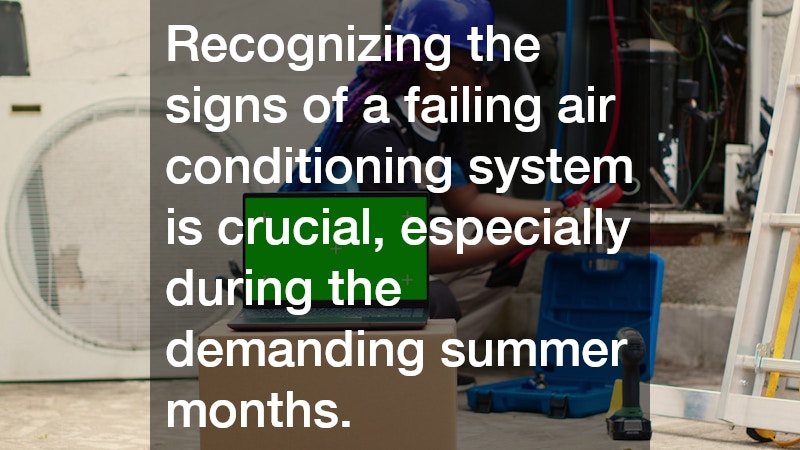As the sweltering heat of summer approaches, the last thing any homeowner wants is a malfunctioning air conditioning system. A well-functioning AC is essential for maintaining comfort and safety, especially during heatwaves. Recognizing the signs of a failing unit early can not only prevent unexpected breakdowns but also offer significant savings in both time and monetary resources.
How Do I Know If My AC Needs to be Replaced?
Increased Energy Bills
A sudden spike in your energy bills can be one of the first indicators that your air conditioner is losing efficiency. As an AC unit ages, its components can begin to wear out, forcing the system to work harder and consume more electricity to maintain the desired temperature.
This inefficiency is not only costly but also environmentally unfriendly, making replacement a preferable option in many cases.
Stubbornly high utility bills, despite moderate usage, may be a signal that your AC is nearing the end of its operational lifespan. Upgrading to a more energy-efficient model can drastically reduce energy consumption, often enough to offset its initial cost over a few years. Before deciding on replacement, consider conducting an energy audit to determine if your AC is the culprit behind rising energy costs.
It’s worth noting that while minor fluctuations in energy bills can occur due to weather patterns, consistent increases are a red flag. Inefficiencies can stem from outdated technology or diminished refrigerant levels, both of which are more economically addressed through replacement than repair. In the long run, a new AC unit can lead to substantial savings and reduced carbon footprint.
Frequent Repairs
If it seems like you’re calling HVAC professionals more often than not, it might be time to consider replacing your unit. Consistent repairs not only drain your wallet but also signal that the system is struggling to keep up with demand. Instead of enduring piecemeal fixes, investing in a new AC system can be more cost-effective and hassle-free.
Every time an air conditioner breaks down, there’s a risk of larger problems developing if they’re not addressed timely. Frequent issues can indicate that the unit’s crucial components, such as the compressor or fan motor, are deteriorating beyond repair. In many cases, the cumulative cost of constant repairs can surpass the price tag of a new system.
Age of the AC Unit
The age of an air conditioning unit is a critical factor in determining whether a replacement is necessary. On average, most AC systems have a lifespan of about 10 to 15 years. Beyond this period, the efficiency of the system begins to decline, and issues become more frequent.
Technology advancements mean that AC units today are substantially more efficient than those from a decade ago. Therefore, opting to replace an older system can result in significant energy savings. Knowing the exact age of your unit aids in making an informed decision about timely replacement before complete breakdowns occur.
What Are the Common Signs of a Failing AC System?
Poor Airflow
When you notice that airflow from your AC is consistently weak or nonuniform, it might be a troubling sign. Poor airflow could be indicative of a failing compressor, blocked vents, or aging ductwork. Such issues suggest that the system is beyond regular maintenance solutions and could necessitate a full replacement.
Poor circulation doesn’t just impact comfort but also affects indoor air quality, leading to a less healthy living environment. It can also cause certain areas of your home to be cooler than others, creating uneven cooling which can be frustrating and inefficient. A new AC unit can revitalize airflow, ensuring all parts of your home are evenly cooled.
Neglecting airflow issues can exacerbate other operational problems, resulting in ac replacement. Modern units come with advanced features that ensure optimal air distribution, reducing the burden on the system. Additionally, new installations can incorporate technology that smartly manages airflow and increases efficiency.
Moisture and Leaks
Noticing moisture accumulation or leaks around your AC unit often signals a problem that shouldn’t be ignored. Leaks can stem from a range of issues, including blockages in condensate lines, clogged filters, or cracked drainage pans. Each of these problems, while initially minute, can escalate if the system is aging.
Moisture not only affects the performance of the AC but also poses health risks by contributing to mold growth. This can compromise indoor air quality, leading to respiratory issues and other health concerns. Replacing an old system eliminates these risks by ensuring that condensate systems are operating effectively.
Timely addressing moisture issues can safeguard your home structure from damage. An updated system is less likely to face such problems due to modern engineering standards. Plus, new units often come equipped with sensors and smart features to alert homeowners to potential moisture problems early.
Unusual Noises
The presence of strange noises coming from your air conditioning system can be a harbinger of trouble. Sounds like grinding, rattling, or squealing often indicate deteriorating internal components, such as bearings or belts. It’s crucial to address these warning signs promptly, as continued use can lead to more severe damage.
While some noise can be attributed to minor issues, persistent sound often points to larger mechanical failures. If these noises occur frequently, it might indicate that the entire system is struggling, and replacing it can prevent further inconvenience. A new system promises quieter operation with better design efficiencies.
Ignoring these audible signals can escalate repair needs that might be both costly and inconvenient. Transitioning to a new AC model eradicates such problems and offers peace of mind with the assurance of smooth operation. Advanced AC systems also feature noise-reduction technology, enhancing your overall living comfort.
Recognizing the signs of a failing air conditioning system is crucial, especially during the demanding summer months. Increased energy bills, frequent repairs, or symptoms like poor airflow and unusual noises suggest it might be time to consider a replacement. Proactively addressing these issues with a new unit ensures comfort, efficiency, and cost savings, enhancing your living environment and peace of mind.




